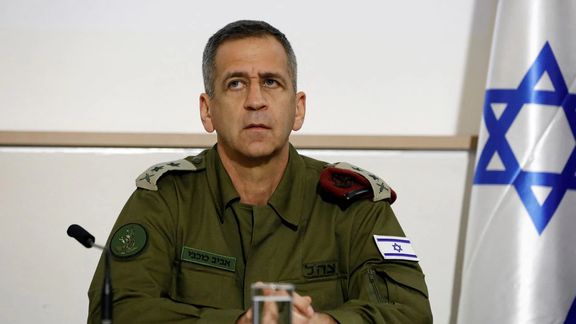Leaving His Post, Top Israeli General Speaks Of ‘Targeting’ Iran

In a series of media interviews, Israel’s outgoing chief of staff concentrated on his unease over incoming ministers’ approach to the West Bank.

In a series of media interviews, Israel’s outgoing chief of staff concentrated on his unease over incoming ministers’ approach to the West Bank.
But with Israel Hayom, Lieutenant General Aviv Kochavi also outlined plans for attacking Iran. He said that the Israeli military had three schemes : “a retaliatory strike…unrelated to the nuclear issues,” the “taking out of the Iranian nuclear installations and auxiliary sites,” and, should the situation escalate, “a full-fledged campaign…[with] the targeting of military sites and other assets.”
Asked to compare with Israeli attacks on nuclear reactor in Iraq – referred to mistakenly by Israel Hayom as Iran – and Syria, in 1981 and 2007 respectively, Kochavi talked of “neutralizing, inflicting major damage to Iran’s nuclear program.”
The parallel may concern United States officials even as Washington has stepped up military co-operation with Israel. The French-supplied Iraqi reactor and the clandestine Syrian operation were at early stages, while Iran has been subject to intrusive international inspections and has enriched uranium stockpiles to 60 per cent purity since the United States in 2018 left the 2015 Iran nuclear agreement, the JCPOA (Joint Comprehensive Plan of Action).
‘Lying constantly’
Kochavi appeared to justify an attack by suggesting Tehran was “lying constantly” and had a military nuclear program “working at a very slow pace.” The latter contradicts US intelligence assessments that Iran gave up research into nuclear weapons in 2003 and has not taken a political decision to produce a bomb.
Kochavi claimed Iran planned four bombs, three with uranium enriched to 20 percent and one with 60-percent-enriched uranium. It was unclear if he meant Tehran aimed at ‘dirty bombs’ that spray radioactive material without a nuclear explosion or intended to further enrich existing stockpiles to create enough 90-percent-enriched uranium for four nuclear bomb.
But he held out the possibility that “five different sets of pressure” on Iran could lead to a nuclear “deal [with Iran] that could be called very good and would have no sunset.” These five pressures operated “economically, socially, diplomatically,” coming also from Iran’s “military failures, and the fact that their proxies in the region have not delivered.” The five should be linked, he argued, to “a credible military option.”
Much of Kochavi’s interviews have reflected his concern over ultra-Zionists in the new government of Benjamin Netanyahu, particularly finance minister Bezalel Smotrich and security minister Itamar Ben-Gvir. With Israel Hayom, Kochavi defended Israeli Defense Forces (IDF) autonomy in Gaza and the West Bank against political interference to the extent that “only the IDF determines what is moral and what is not; what is appropriate and what is not....”
‘Aggressive line on Iran’
Kochavi said that Gaza was “stabilized” and that “most of the attacks” in the West Bank had been “thwarted,” although “we have no way of knowing when this wave will subside.” With Jewish settlements expanding, last year was the most violent in the West Bank since 2005.
The new government is promoting concern among some Israelis, including those who believe settlements doom the ‘two state solution’ still formally supported by the US. Amos Harel, the Haaretz military correspondent, wrote January 6 that the government was “locked in ultra-hawkish rhetoric” with Netanyahu “espousing an aggressive line on Iran.”
Harel suggested that new defense minister Yaov Gallant, despite a “history of hawkish statements on Iran…[was] not necessarily a hawk on the issues,” but that he faced a power struggle with both Smotrich, who controls finance for the West Bank, and Ben-Gvir, who has already made a visit to al-Aqsa mosque compound, east Jerusalem, seen as provocative by Palestinians.
In Jerusalem Strategic Tribune this month Ksenia Svetlova, a former member of parliament, argued that with the new government the “idea of a two-state solution…seems just as feasible as ending world hunger, leaving most Israelis in limbo.”